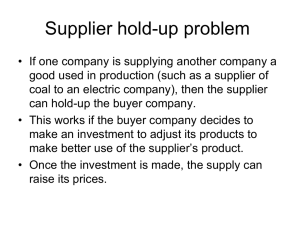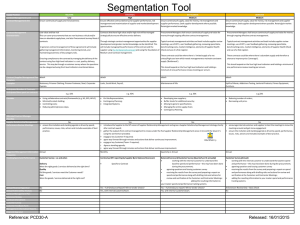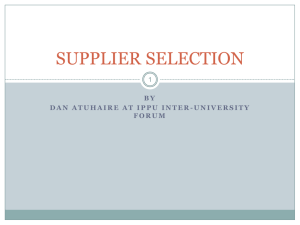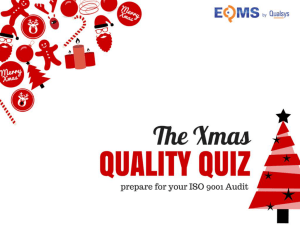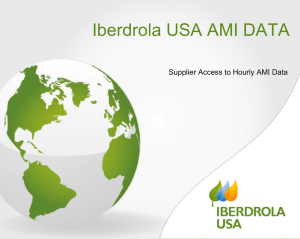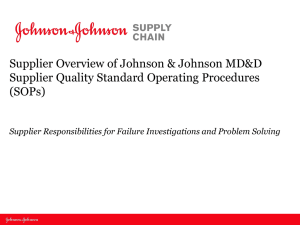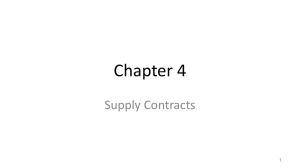Supplier - Standard Bank Student Achiever
advertisement
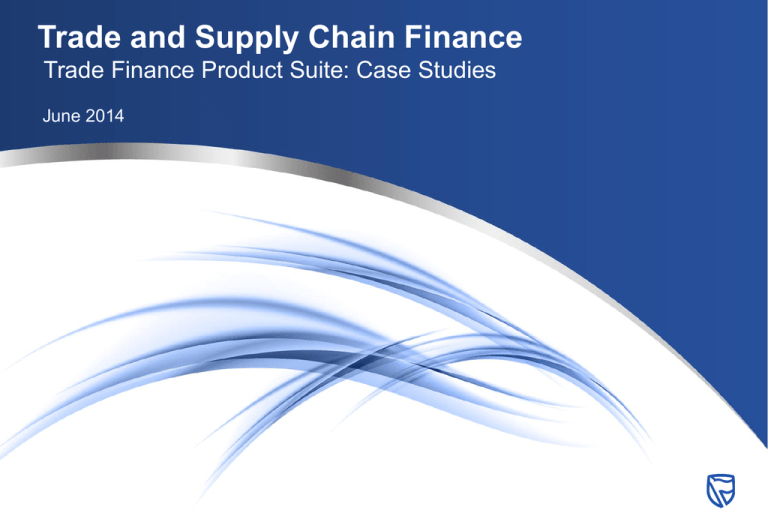
Trade and Supply Chain Finance Trade Finance Product Suite: Case Studies June 2014 Agenda Case Studies 1. Receivables discounting: Agricultural and construction equipment manufacturer 3 2. Supplier financing: FMCG company 8 Receivables Discounting This is an innovative solution that supported the management of working capital by agricultural and construction manufacturer by providing it with an opportunity to increase its liquidity; improve its balance sheet metrics and mitigate its supply chain risks. Agricultural and construction equipment manufacturer Deal Background Supplier: The client The client is a leading global manufacturer of agricultural and construction equipment. It has 37 manufacturing companies with 11500 distributors in over 170 countries providing a full range of the products. With a strong footprint in Europe, North America, Latin America and Asia, their customer base continues to grow. Company profile Buyer: Local SA buyers The client had a requirement to accelerate their cash from receivables stemming from sales to local South African buyers. Improvement in the client ‘s accounts receivable metrics (reduction in DSO) through the sale of their receivables on a nonrecourse basis. Client objectives Underlying commodity/goods traded: Agricultural equipment Terms : Average tenor of 120 days Parties to the transaction Non-recourse invoice discounting Solution Transaction Mechanics Ongoing contract of purchase and sale between the supplier and the buyer. 1. The buyer places a purchase order. Supplier 2. Pro forma invoice is sent to the buyer. 3. Goods are shipped and the invoices are presented to the buyer. Portfolio of Buyers Buyer 1 Buyer... 4. The supplier presents receivables schedule & request to discount to Standard Bank. Buyer n 5. The discounted funds are paid to the supplier on day 1. 6. The full value of the invoice is paid to Standard Bank at maturity date. Transaction initiation Discount date Invoice maturity date 5 6 Time 1 2 3 4 R R0 R95 A Cost borne by the supplier A R100 Deal Process Pre-transaction Execution • • • Identification and qualification of buyers from supplier’s debtors book. KYC and credit review is completed on qualifying buyers. Post-transaction Preparation of the following signed documents by supplier: Receivables schedule (existing ERP should be downloaded for the extraction of this schedule) Discounting request • The buyer will receive a settlement advice from SBSA 7 days prior to the maturity date of their invoices. Document preparation Debtor due diligence Settlement advice • • • • The indicative term sheet is negotiated and accepted. The underlying facility agreement is negotiated and signed by the buyer. Credit process. • Master agreement • Documents to be submitted 3 days prior to financing requirement. Submissions sent may be electronic via email, with originals following at a later stage. Submissions should be sent to trade finance transactors only. Document submission Settlement by buyers • Payment process Authorised signatory delegation • • • Assignment and confirmation by supplier of authorised signatories under their board resolution (submission of board resolution). • Upon receipt of documents SBSA will require 3 days for review. Documents are vetted, instructions are verified and signatures are confirmed. On completion of the review & acceptance of documentation, SBSA will advance payment to the supplier for a discounted invoice value. Upon the maturity dates of the various invoices, the buyers settle SBSA for the full value of the invoices. Payment process Benefits of Receivables discounting Risk mitigation Non-recourse invoice discounting provided the supplier with a method of eliminating exposure from any potential defaults by the buyer. Liquidity & Working capital efficiencies The supplier was able to experience an acceleration of working capital and an increase in cash balances, which they could use to fund other disbursements or to overcome asymmetries between cash collection and disbursement. Balance sheet management The sale of their receivables provided the supplier with the ability to reduce their Days sales outstanding (DSO) , thereby resulting in an improvement in their accounts receivables metrics. Supplier Financing The supplier finance solution was utilised to support key suppliers of the FMCG company with cost effective liquidity and still afforded them with extended days payables in an efficient, simple and visible process. FMCG company Deal Background Supplier: Various local suppliers A multinational FMCG (fast moving consumer goods) company. (FMCG) It manufactures and markets food and beverage products, including convenient meals, refreshment beverages and coffee, chocolate, cheese and other grocery products across various regions and countries around the world. Buyer: FMCG The FMCG procures most of its raw materials from local suppliers with a few purchases coming from cross border suppliers. Company profile As part of its international procurement policy, all the subsidiaries of this FMCG had to move their days payable metric to 120 days. In extending the payables term, the company also required the balance sheet benefit by maintaining financial transactions as a trade payables. Client objectives Underlying commodity/goods traded: Various products Terms : Various tenors (30,60,90) Parties to the transaction Supplier financing Solution Transaction Mechanics Ongoing contract of purchase and sale between buyer and suppliers 1. Purchase order raised. 2. Supplier delivers goods and presents invoices. Portfolio of Suppliers Buyer 3. Supplier sends discounting request to buyer for acceptance. Supplier 1 4. Buyer provides accepted discounting request to supplier. Supplier ... Supplier n 5. Supplier presents invoice schedule and discounting request to Standard Bank. 7. Settlement by buyer at invoice maturity date for full invoice value . 6. Standard Bank pays suppliers discounted invoice value on day 1. Procurement initiation Discount date Invoice maturity date Time 3 4 5 2 1 6 7 R R0 A Interest cost borne by supplier R95 A R100 Deal Process Pre-transaction Execution • • Identification and qualification of suppliers from the buyer’s creditor book. KYC completed on qualifying suppliers. Suppliers are then on-boarded onto the supplier financing programme. • • Preparation of the following signed documents by the buyer: Invoice schedule (existing ERP should be downloaded for the extraction of this schedule) Financing request Payment undertaking Supplier due diligence • • • The indicative term sheet is negotiated and accepted. The underlying supplier financing agreement is negotiated and signed. Credit process. • • Documents to be submitted 3 days prior to financing requirement. Submissions sent may be electronic via email, with originals following at a later stage. Submissions should be sent to trade finance transactors only. Assignment and confirmation by the buyer of authorised signatories under their board resolution (submission of board resolution). Document submission Settlement • Payment process • • • Upon receipt of documents SBSA will require 3 days for review. Documents are vetted, instructions are verified and signatures are confirmed. On completion of the review process and acceptance of documentation, SBSA will advance payment to the suppliers for the discounted value of the invoices. The buyer will receive a settlement advice from SBSA 7 days prior to the settlement date. Settlement advice • Authorised signatory delegation • • Document preparation • Supplier finance agreement Post-transaction The authorised signatories confirmed by the buyer and accepted by SBSA will complete and sign a settlement instruction, which gives SBSA authority to debit any of the buyer’s accounts held with SBSA. SBSA will undertake to debit the full principal invoice value. Payment process Benefits of Supplier Financing Working Capital optimization via payments and receipts matching The extension of the payment terms also provided the buyer with the ability to optimize their working capital by matching the receipt of funds with their payment obligations. Extension of days payable outstanding The buyer was able to extend its credit repayment terms to 120 days as per their requirement , thereby meeting their primary objective.. Liquidity & Working capital efficiencies The suppliers were able to experience an acceleration of working capital and an increase in cash balances, which they could use to fund other disbursements. Therefore improving their accounts receivable metrics and overall working capital cycle. Cheaper funding The suppliers were able to get better funding rates on the strength of the buyer company's balance sheet. End “Best Trade Finance Bank in Africa 2013.” “A vote of confidence in our Trade Finance Exchange capabilities.” “Standard Bank has been voted best Trade Finance Bank in South Africa and the rest of Africa at the Global Finance Awards 2013” “This award is another testament to Standard Bank’s expertise in Trade Finance across Africa and further demonstrates our commitment to the African continent and its international trading partners.” Thank you

